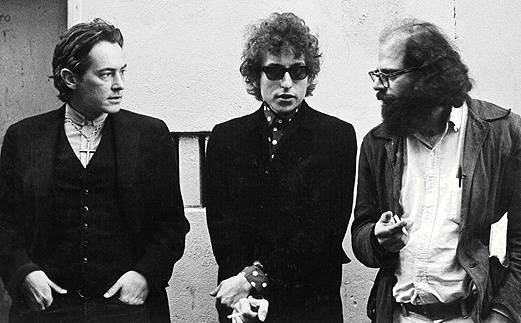Gays and Beats
Historical Essay
by Bill Brent
Michael McClure, Bob Dylan and Allen Ginsberg at City Lights Books, 1966. The Beats, especially around Ginsberg, laid the foundation for later synergies created by gay poets.
Photo: City Lights Books
After the Second World War, San Francisco slowly became home to both a gay bar subculture and a homophile activist movement, which mostly operated in isolation from each other. In the '50s and early '60s, however, these two groups began to converge. Several factors probably accounted for this. There was a burgeoning Beat culture in North Beach, two homosexual bar payola scandals involving the police department and the mayor, and an invasive police crackdown against gay bars that lasted three years. Eventually, these factors drove politics into the bars, and the bars became part of the movement.
The San Francisco Beats and the gays had a symbiotic relationship. Jack Kerouac and Allen Ginsberg broke through the underground and achieved mythic status with their work--respectively, On The Road and Howl. Media reaction focused attention on San Francisco. In a special San Francisco issue of Harper's, Bruce Bliven wrote that Beats were "young hedonists who don't really care whether something is good or evil, as long as it is enjoyable." One could say the same about the underground culture of gay leathermen that was about to emerge. An Examiner headline proclaimed San Francisco as "Mecca" for a generation in revolt. Local media coverage of the Beats often used shock tactics; exposs of orgies, sexual perversion, and sordid experimentation.
Part of the resultant downside was an influx of tourists and runaways into North Beach not unlike the wave of party-crashers that would besiege the Haight-Ashbury a few years later. As a result, the cops tripled their surveillance of the area, invading Beats' "pads" in search of drugs and illicit sex. They harassed Beat gathering places.
Homosexuality was part of the North Beach scene. Many of the Beats were homosexual, including Ginsberg, Jack Spicer, Robert Duncan, and Robin Blaser. Others such as Kerouac were probably into sexual experimentation. Ginsberg slashed through gay stereotypes of gay male sexuality with Howl's celebration of joyous and even holy sexual union.
He served as a bridge between the tolerant literary world and the emerging gay political scene. Both Beats and gays challenged the conformist pressures of the decade. Thanks to the Beats, gays could now view themselves as nonconformists rather than mentally ill rebels with a cause.
Finally, there was significant geographic overlap between the two cultures. North Beach was home to gay and lesbian bars, including the Black Cat, an area institution, as well as gay cruising areas, with all spreading down to Polk Street and into the Tenderloin.
Relentless police harassment of the bars finally triggered a reaction from the patrons of the Black Cat (which provided the setting for part of On The Road). Ginsberg described it as "the greatest gay bar in America." The bar's owner, Sol Stoumen, was unwilling to make the payoffs expected in that era of proprietors whose clientele included homosexuals. He found himself in trouble with the law and eventually spent over $38,000 in legal fees. Thus began the connection between gay bars and gay politics. A Black Cat employee and popular performer, José Sarria, began incorporating politics into his campy bar act. For many, his comments marked the beginning of their awareness of their right to be free from harassment. He even became the first out gay person to run for supervisor in San Francisco. His 5,600 votes foreshadowed the powerful political constituency that gays and lesbians would become.
The happenings at the Black Cat eventually led to the formation of the Tavern Guild, a coalition of gay bars, in 1962. The Guild retained a lawyer and bail bondsman for anyone arrested in or near a gay bar, and it published a brochure on how to deal with being arrested or harassed by policemen. The rise of the Guild gave political legitimacy to gay bars, defending their right to be free from arbitrary harassment. The Tavern Guild eventually became a political force in local politics.
Black Sheets magazine, from which this material was excerpted, can be ordered by sending an age statement with your order to Black Books, PO Box 31155, San Francisco CA 94131-0155. $6 for issue 12, or $20 for a 4-issue sub. Complete catalog of all our publications on underground culture is just $1. And yes, we do take plastic! (415) 431-0171. [Please note, this information is from 1998.]

